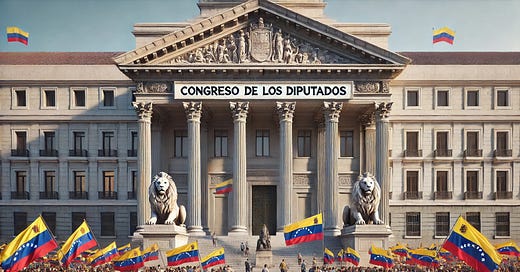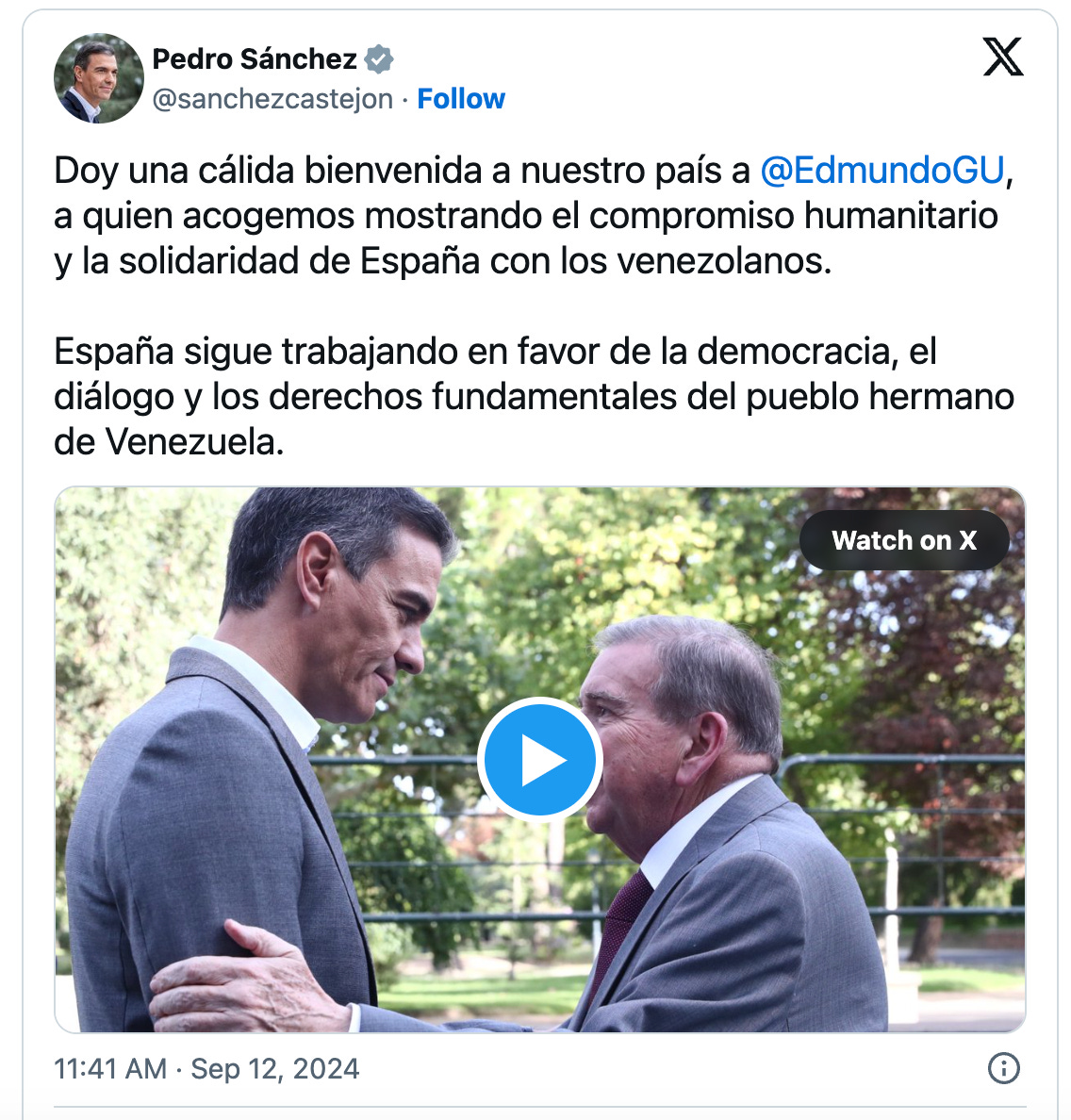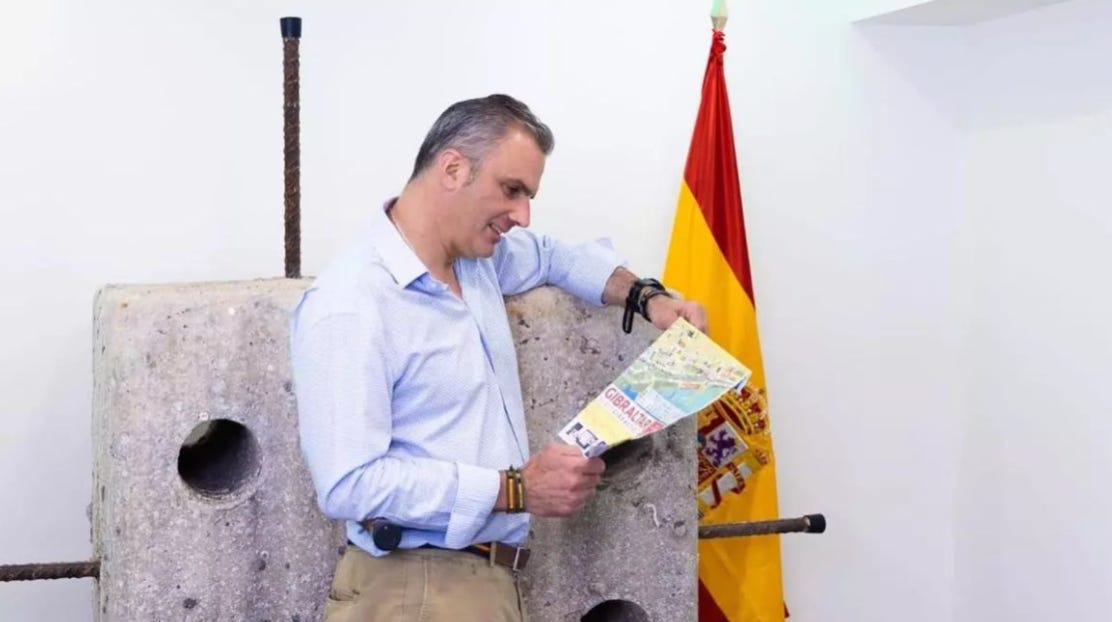🇻🇪 This Week in Spain: The Venezuela Dilemma
The ex-King keeps it in the family, farewell to rental scooters, and a fight over a cement block.
By @IanMount and @AdrianBono | September 12, 2024 | Madrid | Issue #69
🎉 Welcome to The Tapa, an English-language, weekly newsletter about all things Spain!
🥜 This Week in a Nutshell: And just like that, we’re involved in one more international conflict—this time with Venezuela. Why? Spain decided to grant asylum to opposition leader Edmundo González Urrutia, something that once again has divided the local political class (because remember: agreeing on anything = bad).
🙏 Remember that if this email gets truncated at the bottom because it’s too long, just click here to read the rest on Substack.
🙌 One more thing for new subscribers: we are offering paid subscriptions, and we’d be thrilled if you purchased one to help build this enterprise we’ve had so much fun creating. (And to those of you who have already subscribed, thanks for the love 🥰.)
🕺If you haven’t subscribed yet, please do so by clicking on the button below.
🫶 And if you already have, please send this newsletter around to your friends and family and help us keep growing.
Little Caracas
Spain Receives Another Exiled Venezuelan Politician…and the PSOE and PP Fight About It
It’s not every day that Spain welcomes a Venezuelan political exile after the supposedly socialist but definitely authoritarian regime of Hugo Chavez mini-me wannabe President Nicolás Maduro accuses them of crimes against la patria and threatens to arrest him (or actually does).
Wait! It does sorta happen every day. It also happened with former Caracas mayor Antonio Ledezma (November 2017), opposition pol Leopoldo López (October 2020), ex-president of the national assembly Julio Borges (2021) and former attorney general Luisa Ortega (2021). So it’s sorta everyday-ish.
Still, what happened this week was special. Venezuelan opposition politician Edmundo González Urrutia arrived in Madrid on a Spanish Air Force jet, yet another exiled anti-Maduro pol.
Don’t recognize González Urrutia’s name? That’s because he wasn’t a big deal until actual big-time (but disqualified from running) opposition leader María Corina Machado chose him to run for president against Maduro. González Urrutia then beat Maduro like a red-headed stepchild (seriously, in a landslide) according to every living human who can count except the only one who matters in Venezuela—Nicolás Maduro.
But this is tense for Spain because…politics. We won’t try to explain Venezuelan politics (that’s for our sister pub in Caracas, The Arepa, 🤣), but suffice it to say that the PP and PSOE have very different takes González Urrutia’s flight to Madrid.
PSOE view. Prime Minister Pedro Sánchez has characterized the granting of asylum and military flight as a “gesture of humanity” and it’s hard to disagree with that, at least superficially.
Why? González Urrutia is an elder gent (75) who had been dodging an authoritarian regime that was unhappy he’d beaten it (and issued an arrest warrant to prove it), apparently spending more than a month in the Dutch embassy in Caracas before moving to Spain’s and requesting asylum.
The PP begs to disagree. Spain’s centre-right party has long been a big fan of Venezuela’s opposition (which leans right-ish—sorta, long story) and very anti-Maduro.
Actually, a gift to Maduro. For the PP, González Urrutia’s exit from Venezuela weakens the opposition push to get Maduro to accept his loss and, in that, is a sort of gift to the Venezuelan strongman’s regime. In the words of PP bigwig Esteban González Pons, taking González Urrutia out of Venezuela without recognizing him as a legitimate president “is not doing democracy a favor, but rather removing a problem for the dictatorship.”
Well, actually… This wasn’t helped when, after Spanish foreign minister José Manuel Albares denied that there had been negotiations between Spain and Venezuela over the asylum move, Venezuela’s VP Delcy Rodríguez countered that there had been “ample conversations” to set up the departure.
Plus, ZP involvement = bad. Even worse for the PP, former PSOE PM José Luis Zapatero—who is viewed as an undercover Maduro fan and Chavista by the right—was reportedly deeply involved in the process. In the words of PP MP Cayetana Álvarez de Toledo (our favorite Spanish Bond villain), “Zapatero has been working for years in favor of the regime, and he is working for the most beneficial outcome for the Maduro regime.”
Which gets us to this week’s stick in the eye for PSOE and Sánchez. On Wednesday, Parliament approved a PP-led resolution calling for the recognition of González as the elected president of Venezuela with 177 votes in favor from the PP, Vox, CC, UPN, and the PNV.
Say it: “Maduro lost.” The resolution says that this “recognition is based on the repeated refusal of Venezuelan electoral authorities to publish the results in a timely and proper manner, the publication by the opposition of 83.5% of verifiable ballots demonstrating a decisive electoral result”.
But there’s more. It demands “the recognition of Edmundo González as the ‘legitimate’ president”, and also urges the Sánchez administration to lead this recognition in European institutions and international bodies, to ensure that he takes office as Venezuelan president on Jan. 10, 2025.
Not that it matters. Yesterday’s proposal has no practical effect, though, as only the Spanish government led by Sánchez can recognize González’s legitimacy (and for now, the PM has said that his decision will be made with the rest of the EU).
Until then. In the meantime, the EU insists that Maduro releases the voting records to guarantee the full transparency and integrity of the electoral process.
Meanwhile, in Venezuela… Maduro’s Chavista officials are not happy with yesterday’s vote in the Spanish Parliament. Jorge Rodríguez, one of Maduro’s top political operators and president of Venezuela’s National Assembly, has called for a passing a resolution that urges his country to immediately “break all diplomatic, trade and consular relations” with Spain. Oh, and to also stop all flights (!). ✈️
🤬 Angry $&%#! The country’s Interior Minister, Diosdado Cabello, also seemed furious, asking “what the f*ck does the Spanish Parliament have to do with Venezuela’s domestic affairs? They think we’re a colony and they are an empire. We kicked them out 300 years ago and we will kick them out again.” Ah, history.
But isn’t this a lot of playacting? In a sense, it is. The Sánchez government has pushed back at the PP-led resolution as just an empty symbol that changes little and makes negotiations harder. And Venezuela needs all the relations it can get.
Keep on keeping on. Not to be dissuaded, PP sources have told El País that the EPP in Brussels plans to introduce a proposal similar to the one approved yesterday in Madrid, recognizing González as the election winner and legitimate president.
Might be a tough lift. EU governments refuse to recognize a victory by Maduro, but also don’t want to recognize the leader of the opposition as the winner to avoid what happened five years ago with Juan Guaidó, who was recognized as the legitimate president of Venezuela and ended up doing, well, nothing. Which is embarrassing.
Tie it up in a bow. This morning, Prime Minister Pedro Sánchez met with Edmundo González in the presidential palace, tweeting that Spain “would continue to work in favor of democracy, dialogue and the fundamental rights” of Venezuela. So, at least there’s handshakes?
More news below. 👇👇
🔔 But First, A Message From Our Sponsor
Bucólico Café is a project of connection that was born as a specialty coffee shop.
We value time and understand that it represents both a cycle and an instant—chronology and nostalgia. Bucólico is a space that connects one’s soul with the purity, lightness and beauty of the countryside—while being in the city. Via a cup of coffee, a piece of cake or a song…
Located on Calle de Barbieri 4 — a few blocks from Plaza Chueca — Bucólico reassures the soul with a feeling of home.
Follow Bucólico Café on Instagram.
💬 Five things to discuss at dinner parties this week
🛴 1. Annoying rental electric scooters are leaving Madrid
No more public 🛴! Madrid has unexpectedly announced that electric rental scooters will no longer be permitted in the city starting in October. The reason? Seems like the three companies with operating licenses (Lime, Dott and Tier Mobility) didn’t comply with safety regulations, according to Mayor José Luis Martínez-Almeida.
Lots o’ scooting: Some 6,000 scooters are scattered throughout Madrid and, according to city authorities, none of the three companies have ensured that scooters are parked in designated zones or kept out of pedestrian areas, both crucial for the safety of vulnerable folks, like, you know, the elderly.
No learning. Authorities also said the companies did not follow through on promises to offer free driving lessons for users (to be fair, we can’t think of anyone who’d take scooter driving lessons, but apparently it’s illegal for two people to ride the same scooter—who knew?).
No tracking either. Another problem involved the failure to use required GPS, to monitor the scooters’ locations and prevent their use in prohibited areas. City authorities said because the companies failed to properly implement it, scooters would often end up parked on the sidewalk, which is incredibly annoying 🤬.
The companies affected are (unsurprisingly) not happy. Lime said the decision to revoke their licenses was “unilateral” and unexpected, and that they will file an appeal against it.
Nah… Madrid insists that the decision is final, and city officials express frustration over the companies’ “lack of transparency”, accusing them of denying them access to key operational data, which affected the city’s ability to verify the proper distribution of scooters across neighborhoods.
Fines a’plenty. Local media reports that between 2021 and 2023 there was an average of 11,000 fines per month issued by the city (which is a lot).
We’re not the first. You’ve probably heard stories similar to this before. Barcelona, Paris, and Melbourne have all kicked the electric scooter out of their streets due to (fatal) accidents, injuries, and many riders’ anarchic behavior.
Dear scooter owners. Oh, and in case you were wondering: this ban is for rental scooters only. That means that if you have your own personal ‘lectric scooter, you’re still allowed to use it (as long as you comply with traffic regs, natch).
So what now? Bikes, we guess. We know. Bikes sound so 20th century. Gross. Does this mean we have to pedal and engage in physical exercise to go places, like some sort of burro 🫏. (Yup.)
2. 👑 Ex-King Juan Carlos I is a shining example of fatherhood for us all (ok, not really)
Let no one say that Spain’s emeritus King Juan Carlos I (aka JC1) does not want to take care of his children. And let no one say he’s ever been the least bit transparent about where his money is from (but that’s for another story).
Now, JC1 is uniting his various hidden fortunes the world over into One Big Fortune, El Confidencial scooped this week, that will be held in a foundation in…Abu Dhabi! Why? To take care of his daughters, Infantas Elena and Cristina, (Yes, the Infants!).
The problem. Elena and Cristina currently have jobs at Fundación Mapfre (€300,000) and Fundación Aga Khan (€400,000) respectively which seem to be a little make-up-a-job-for-JC1’s-kids as the ex-King is worried that they’ll be cut loose when he dies, El Confi reports. Added to that, both Infants reportedly spend far more than their salaries and are already topping up with the JC1’s funds.
The solution. A fund in Abu Dhabi allows JC1 to combine and keep his funds in an almost tax-free manner, without revealing the owners or uses of them. Carlos Portocarrero de las Heras, a Spanish lawyer with the U.K. law firm Clifford Chance, oversaw the foundation’s creation, El Confi reports in another article.
The ex-King is super-rich, right? Well, yes, compared to you. But no, not when it comes to other royalty. After King Alfonso XIII (JC1’s grandad) was deposed in 1931, Spain’s royal Borbón family was left dependent on the kindness of strangers/overseas royalists for decades. And when the Borbones were reseated at royalty in 1975, they got the title, but not all the royal stuff. So JC1 took to accepting…gifts.
From whom? That’s a good question. They came as commissions, royal watchers said, for petroleum or weapons, or just as straight-up gifts. The most famous one, of $100m, reportedly came from the late Saudi King Abdullah (that’s according to JC1’s ex-lover Corinna zu Sayn-Wittgenstein, née Larsen, who said she received €65m as a gift but which other royal watchers say was meant for her to hold away from prying eyes).
Mo’ money, mo’ problems. Whatever its source, JC1’s new wealth—or rather, the tax and romantic scandals that came with it—contributed to his downfall and abdication in 2014.
There was the undisclosed €40,000 trip to Botswana in 2012 — paid for by a Saudi businessman and shared with Larsen and her child — that came to light when he broke his hip and had to be airlifted home. Surprise! That angered Spaniards as they suffered through the global financial crisis.
Tax tangles. In December 2020, JC1 paid the Treasury €678,393 to avoid tax charges for not declaring the money he received from a Mexican businessman. And in February 2021, he paid another €4.4m to regularize the private flights his cousin Álvaro de Orleans allegedly gave him.
“Not me”, says his son and Spain’s current king. Felipe VI (F6) renounced his part of his father’s inheritance in 2020, after the Telegraph (h/t friend-of-Tapa James Badcock) uncovered documents showing that F6 was listed as a beneficiary of the Lucum Foundation, a fund that held the Saudi gift money. He also ended JC1’s €194,232 annual stipend at the time. (Elena and Cristina stopped receiving royal stipends when they stopped forming part of the royal family in 2014.)
But think of The Infants! At least now the middle-aged royal kids can sleep peacefully, thanks to good ol’ dad.
3.📺 David Broncano’s move to La 1 seems to pay off
David Broncano is back on television and so far he seems to be exceeding expectations. Back in March, we told you about how the host of the hit late-night style show La Resistencia on Movistar+, a streaming platform, was being courted by RTVE to take his particular interviewing style to the public broadcasting network La 1.
Beat Motos! The goal was to compete with king of late-night Pablo Motos and his top-ranked show El Hormiguero on Antena 3. As it happens, Motos has been highly critical of PM Pedro Sánchez lately, and having Broncano’s young and progressive voice on prime time could act as a counterbalance.
Six months (and €28 million) later, Broncano has made the move to La 1 and it looks like the network’s risky play is paying off. His new show, La Revuelta (which premiered on Monday and is formatted exactly the same as his previous show) has been the most watched show for the last two nights.
So yes, beating Motos. Last night alone, over 5.8m people tuned in at some point to watch La Revuelta (20.5% of share), while 5.1m (16.8%) preferred El Hormiguero. While these are provisional figures, this is excellent news for a network that had to deal with lots of criticism from people who weren’t happy about hiring someone like Broncano with public funds.
Now, if you don’t speak Spanish (or don’t watch Spanish TV) you probably don’t even know who Broncano is or why this matters, but trust us, you should at least be aware of his existence as, like it or not, pop culture is the politics of the 21st century.
Broncano’s interviewing style is very down to earth. He talks to his guests and interviews them in a way that makes him sound like any other Spanish guy at a dinner party who can discuss politics, Rosalía and Call of Duty. He’s like the guy you just met at a party who is holding a drink and whose tongue-in-cheek comments make you laugh and feel at ease.
One of the highlights of the show is its unique guest selection, which includes individuals who may not be widely known but have inspiring stories to tell. On the first episode, Aitor Francesena, a visually impaired world champion surfer, appeared on the show to discuss his life and career.
All of this has made him very popular with young people in Spain, who tuned in to his previous show regularly to see him interview everyone from football players to trap artists and movie stars.
This week on his show, he’s also directly addressed speculation that his move to La 1 was politically motivated. He denied getting paid a ridiculous amount of money (he says he’s already rich) or that his show has any government agenda (his co-hosts claimed to be in shock about this and jokingly unveiled a Sánchez tattoo during the show and said they expected the audience to turn into “gays and unaccompanied migrant minors” by the end of the first episode).
La Revuelta airs Mondays to Thursdays at 9:40 p.m. on La 1. El Hormiguero airs Mondays to Thursdays at 9:45 p.m. on Antena 3.
4. 🇨🇳 PM Sánchez wants China to know he’s a changed man
If rolling eyes made a sound loud enough to hear, today you would have heard the eye-rolling in Brussels all the way in China. Because PM Pedro Sánchez said something, and Germany’s Chancellor Olaf Sholz then said, “Yeah, what he said.”
Excuse me? Sánchez has been on a trip to China to
avoid fractious the debates happening in Spain’s parliament boost ties with the world’s second-biggest economy as trade tensions build between Beijing and the EU. He told China’s President/Sun-God Xi Jinping that Spain wanted to work constructively to “ensure that relations between the two regions are closer, richer and more balanced.” In other words, closer trade ties, more money, and más tranquilidad.Then on Wednesday, Sanchez said that the EU needed to “re-consider” its plan to impose added tariffs on Chinese-made EVs because, the EU thinks, the companies that make those vehicles get state aid that makes them impossible to compete with. Those added tariffs would raise the duty on some Chinese EVs to nearly 50%.
But didn’t you vote for that? The thing is, back in June Spain was one of 11 countries that voted in favor of increasing the tariffs in a preliminary poll. (A vote on final approval is expected in October.)
So what’s going on? Spain is the EU’s second-largest car maker and wants to attract Chinese investment to build an EV industry (one explicit reason for Sánchez’s China visit). Perhaps more importantly, Spain accounted for €1.3b of the €3bn in pork exports the EU sent to China last year (half of all that China imported)—making it Beijing’s biggest pork supplier 🥓.
Nervous, maybe? Seems so. Spain’s pork farmers 🐷 freaked out back in June, when (as we reported) China opened an “anti-dumping investigation”—i.e. a “we don’t like what you did” warning—after Spain was (then) a top proponent of the tariffs.
At least Spain is reconsidering. Its support of the tariffs, that is. “We don’t need another war, in this case a trade war,” Sanchez said, and it’s clear Spain can’t afford one with China. Hence the change in tone.
That also explains Germany, which is hugely exposed to China auto trade. Olaf Scholz joined Sanchez in calling for the EU to drop its extra tariff plan on Wednesday, noting that Germany wanted to sell its cars everywhere, “But this means that we are also open to get the cars from other countries.” (Which is German for, “Please don’t start a trade war, Xi.” 🙏)
Whether Spain and Germany will get their way is another question. Pressure from two big members could lead the EU to rethink, but Brussels folks say that a majority (including France’s Emmanuel Macron) are for it. Trade war, anyone?
5. ⬛ Gibraltar to Vox to Gibraltar: You, sir, are a blockhead!
This is too good to be true, BUT IT’S TRUE! Back in 2013, during a period of high tension between the governments of Spain and Gibraltar, the GIbralteños placed cement blocks in the sea to create an artificial reef—and, it seemed, to block Spanish fishing boats. So what happened?
Vox bigwig Javier Ortega Smith went to Gibraltar a little later and stole one of the blocks. And then Gibraltar put out an arrest warrant for Ortega Smith, who would face up to 10 years in prison if captured. TOO GOOD!
But it gets better. The block found its way back to Madrid, where it has long been displayed as a kind of war trophy in Vox’s offices.
Now, Gibraltar First Minister Fabian Picardo is kicking the fight up a notch. On Gibraltar’s National Day on Tuesday, he said that he had presented the Spanish government with a demand to repatriate the stolen block. “Well, I have news for Vox and for you, my friends. We are going to get it back and bring it back home,” and, “We will not rest until we recover one of our sovereign assets stolen from our British waters, no matter how long it takes." 💪
You can do macho? I can do big macho? Not one to back down from a ridiculous fight over a block of concrete, Ortega Smith replied (on
TwitterX natch), "Come on, pirate Fabian Picardo. If you dare, come and find it and take it on your back. Spanish Gibraltar! Pirates off the Rock!" 🏴☠️
Just. Too. Good.
🙏 Before you go, please remember to share this newsletter with your friends on social media. The more we grow, the more information we’ll be able to offer each week.








